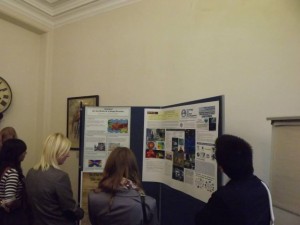 An important part of our annual conference is giving students and recent graduates the opportunity to present their work – through a poster and drinks reception at the end of the day.
An important part of our annual conference is giving students and recent graduates the opportunity to present their work – through a poster and drinks reception at the end of the day.
Last year we had some fantastic posters – from both undergraduate and postgraduate students, and recent graduates. Today we continue publishing the titles and abstracts for some of the posters being displayed at this years event. We published some last week (see this link), here are some others…
**Register now for your ticket**
—-
Death by Corruption
Ekbal Hussain (University of Leeds)
The principles discussed in this presentation will use earthquakes as an example. It is important to stress that these principles apply in various forms to all natural hazards, eg. hurricanes, floods, drought, climate change etc.
Earthquakes are a natural expression of the forces created by interacting plates on the surface of the earth. On average 13,000-18,000 lives are lost each year to earthquakes. But even with our current understanding of earthquake processes and engineering expertise we can design and built structures to withstand shaking from moderate and even large earthquakes. Why then, do so many people die from these events every year?
The answer to this question is by no means simple. Many factors contribute to losses during these events: insufficient knowledge of where all the earthquake generating faults are, cultural practices, uncertainties in hazard maps, poverty and poor building practices among others. For this presentation I will focus on another negative aspect of society: corruption.
The global construction industry was worth $8.7 trillion in 2012and this is recognised to be the most corrupt segment of the global economy by Transparency International’s 2005 global corruption report. Corruption takes the form of using inadequate and/or insufficient building materials, bribes to inspectors and civil authorities, substandard assembly methods and the inappropriate siting of buildings. I demonstrate that corruption directly results to more deaths in natural hazards such as earthquakes.
I end the presentation with examples where transparent practices in construction and management have resulted in great successes in disaster risk reduction.
—-
Hydrogeologists without Borders – UK
Geraint Burrows (Founder, HWB-UK)
The mission of Hydrogeologists Without Borders-UK (HWB-UK) is to support the sustainable development of groundwater in under-resourced regions of the world, through education and linking groundwater experts with partners. Their goals include (i) Connect hydrogeological experts with humanitarian organisations working on groundwater related projects, (ii) Establish HWB-UK as the go-to-portal for knowledge on basic hydrogeological work, (iii) Develop hydrogeological knowledge and capacity in developing countries, and (iv) Advocate hydrogeological best practice in the delivery of aid and development water supply programmes. This poster will give you an opportunity to learn more about their work and how you can get involved.
—-
Supporting International Development through the Integration of Relevant ‘Soft-skills’ into Geoscience Education
Joel Gill (King’s College London)
Geologists have an important role to play in international development, improving disaster risk reduction and access to clean water, sanitation, infrastructure, and natural resources. That geologists can contribute to international development is well established. Less so, however, is an understanding of the ‘soft’ skills required to do this effectively. The fight against global poverty requires an integrated and interdisciplinary approach, demanding a host of skills other than technical geology. Factors such as cultural understanding, cross disciplinary communication, diplomacy, community mobilisation and participation are all aspects that, if lacking, may result in a project failing to have maximum impact.
Whilst project success may be highly dependent on these skills and aspects of knowledge, opportunities to develop them throughout a geologist’s education are not common. Through a discussion of two case studies (based on water and hazards work), this study seeks to demonstrate the value of an integrated approach and the skills that geologists should invest in at an early stage of their career. It proceeds to examine a range of practical ways by which geology students can develop these skills during and after their education. A number of these opportunities are currently being utilised by Geology for Global Development (GfGD), a not-for-profit organisation working in the UK to support young geoscientists to make a long-term and effective contribution to international development.
